#battle for mount olympus
Text
The dynamic between Zeus!Junkerqueen, Hades!Pharah, and Poseidon!Ramattra
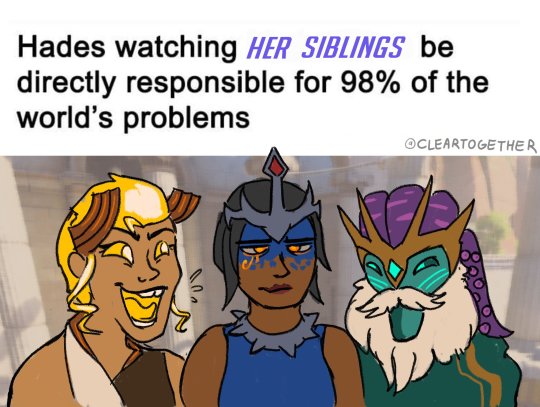
#pharah#overwatch#my content#fanart#fareeha amari#overwatch 2#meme#funny#greek god au#greek gods#battle for mount olympus#junkerqueen#junker queen#odessa stone#hades#zeus#poseidon#ramattra
485 notes
·
View notes
Text
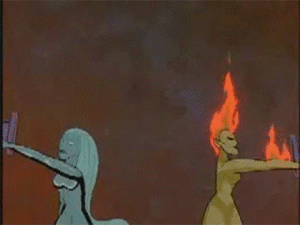


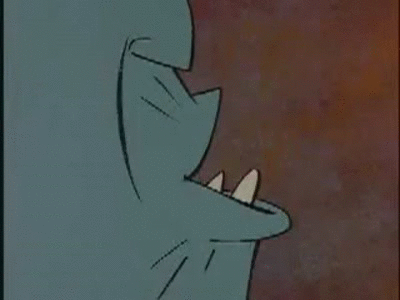
hey friends look what I stumbled across in the pits of my hard drive
#its the titans!!#aren't they cute?#xena#xwp#battle for mount olympus#a cinematic masterpiece if ever there was one
8 notes
·
View notes
Text
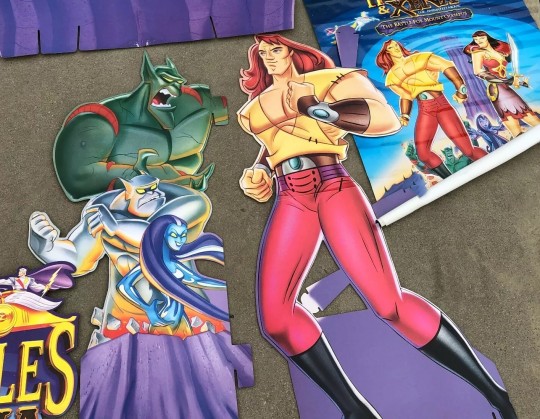
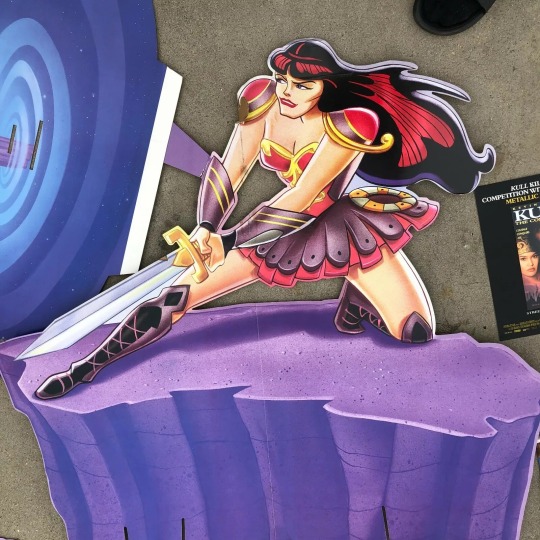

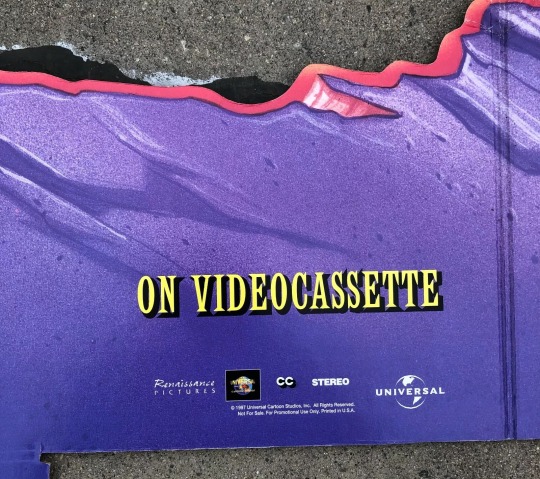
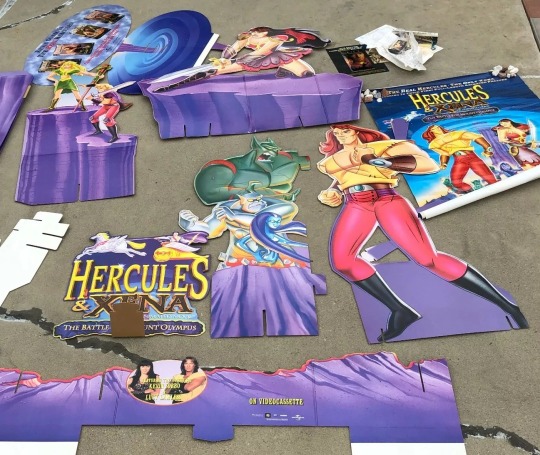
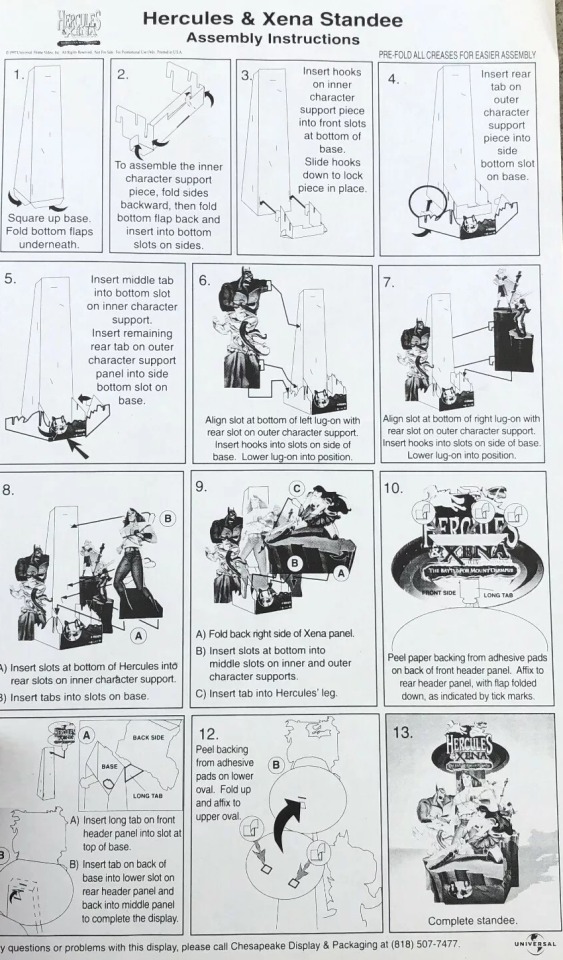
#Hercules and Xena The Animated Movie The Battle for Mount Olympus#Hercules and Xena#The Battle for Mount Olympus#Lynne Naylor#John Loy#Kevin Sorbo#Lucy Lawless#90s
31 notes
·
View notes
Text
⚠️Vote for whomever YOU DO NOT KNOW⚠️‼️
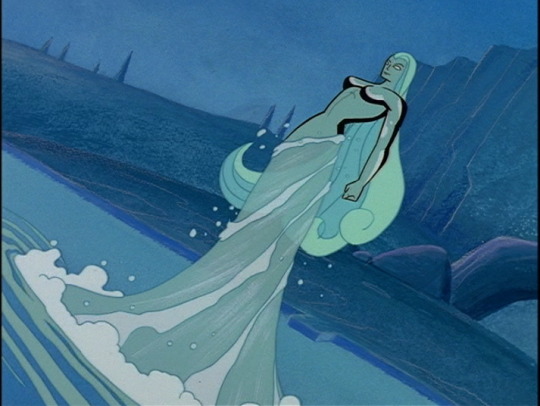
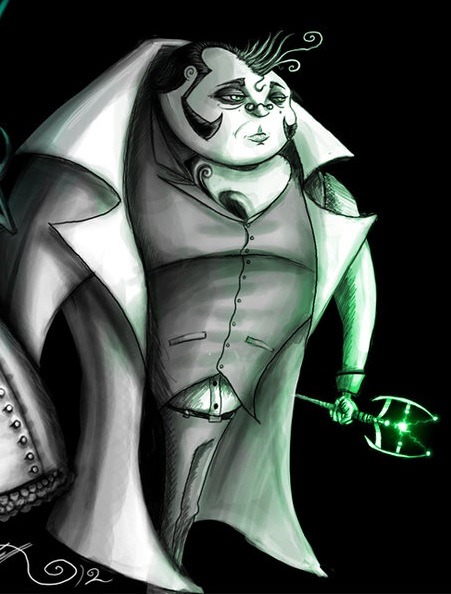
#ultimate obscure blorbo#polls#round 1#Tethys (Hercules and Xena: the Battle for Mount Olympus)#Thadeus Becile (Steam Powered Giraffe)
69 notes
·
View notes
Text

Olympus: The Fall of the Giants (Battle of the Titans)
by Francisco Bayeu y Subías
#olympus#gods#war#battle#giants#titans#art#mount olympus#olympians#greek mythology#mythology#mythological#history#europe#european#jupiter#titanomachy#ancient greece#ancient greek#ancient thessaly#thessaly#greece#gigantes#cronus#zeus#cyclopes#ancient#antiquity#neoclassical#mediterranean
139 notes
·
View notes
Text
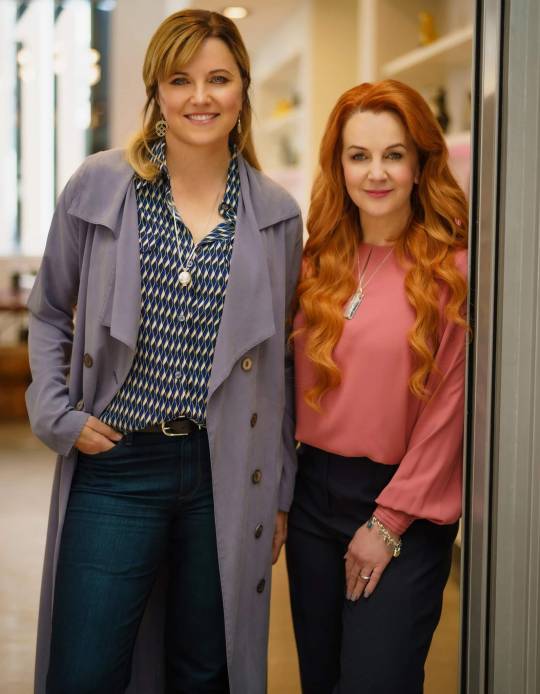
Lucy lawless and Renee O'Connor, who played xena and Gabrielle in xena: warrior Princess
#xena warrior princess#xenaverse#xena#lucy lawless#Gabrielle#renee o'connor#hercules and xena the animated movie the battle for mount olympus#hercules the legendary journeys
6 notes
·
View notes
Text
Changed
The target audience for this consists of exactly one person, who in all likelihood is never going to see it.
For anyone else who stumbles upon this, I apologize in advance for how none of this is going to make sense. Or rather– if you’ve ever seen the hilariously terribad animated crossover Hercules and Xena: The Battle for Mount Olympus, then it ‘makes sense’ as in you’ll probably be able to follow along with what’s happening and to whom. But as far as the question of “what on earth compelled you to even bother writing this” goes– I dunno what to tell ya, man. You just had to be there.
And to the singular audience member-- if you DO happen to see this and do choose to read it– I hope you get some enjoyment out of it. I hope life is being good to you these days. I’m sorry this took almost ten years to actually get written. And I’m sorry for everything else, too.
(Approx 2.6k words. Content warning for body horror; transformation horror)
Every day in Tartarus is uniformly miserable, and yet some days still manage to be worse than others. The monotony of her suffering comes to a roiling peak inside her until all Tethys wants is to scream until her throat boils away and to tear anything she can get her hands on to pieces: the walls of her prison, her companions, the whole world, herself. Dissolve it all to nothing and let primordial Chaos have it.
She never does anything with her aimless wrath but lay in a half-melted heap and seethe. On those days she never has the strength to do more; all she can do is wait for it to run dry and start building anew.
‘Days.’ She scoffs at herself. What a terrible joke. As though the word means anything down here, as though the sun’s ever seen this place. She doubts that Helios– or Selene for that matter, or whatever godling whelps those traitors might have ceded their domains to– ever spare a thought from up in their gaudy little carts for the four of them, or their cage.
Thinking about the high-and-mighty ease with which her supposed allies had turned their backs on their own kin and kind has her simmering with an old, familiar fury. It’s useless, of course, as all of her rage is; but it’s at least something to focus on other than the present moment, and how horrible it is to exist in it. She’s grateful for any distraction no matter how meager or unpleasant, and this particular grudge is so worn and revisited that it’s become almost comfortable.
She’s so enthusiastic about wallowing in the well-plumbed depths of resentment that she fails at first to notice the shift in the bleak atmosphere around her.
The limitless pressure that weighs down on her lessens by just the barest measure. The sluggish heat breaks– the crack is hair-thin, but a break is a break. There’s a feeling of welling up, of being carried along in a current and of being the current rushing forward, and she throws herself into it without hesitating even long enough to hope, or to question.
It draws her up and up endlessly, until the murk of Tartarus splits above her: a jagged wound open to blue-white light. It hurts to look at and it’s all she wants.
When she finally breaches the surface, there is no froth or fountain– she doesn’t emerge from water at all in fact, though she can hear the music of a flowing river close by. Instead she finds herself clambering inelegantly from a great fissure in the ground on her hands and knees.
She doesn’t spare a second thought for her escape route as it closes at her heels, or why it had been so different than before. It doesn’t matter. The sun is stirring a gentle current of warmth through her middle and a cool breeze contrasts it wonderfully as it ripples over her surface. Everything is soaked in color and light.
This second imprisonment had been so much shorter than the first, but already she’d started to forget what any of those little delights even were, just how good it is to be free.
“There you are. You certainly took your time coming up– one would think you wanted to stay in your cage.”
The perfect moment is fouled. Tethys snaps her gaze down to glare at the ground– she knows that toad-voice–
Hera stands before her, as haughty and disdainful as she remembers her.
Tethys almost can’t believe it. Is it Hera who had called her up into freedom? Again? Is this miserable excuse for a queen really standing there looking so pleased with herself, as though she isn’t just repeating the exact same scheme that almost knocked her off her stolen throne the first time?
Something between a snarl and a vicious grin ripples over Tethys’ face, and she raises her fist high. Sunlight refracts through it and scatters beautiful patterns of light over the ground. She hopes the old hag appreciates the sight, and her good fortune in general. She’s so eager, after all, to taste the consequences of hubris, and Tethys is all too happy to oblige her. She’ll give her enough to drown in.
Hera’s expression remains calm and smug. She doesn’t try to shield herself or flee, just makes a complicated gesture with her hands and begins to recite a long string of strange, jagged syllables.
Tethys’ blow never lands.
Agony swamps her the likes of which she’s never known, that no depth of her imagination has ever conjured even in her most vicious revenge fantasies. Words barely begin to encompass it. Even Tartarus pales in comparison.
She’s boiling, she’s burning– she’s going to billow away in a cloud of steam, too fragmented to ever reform. Even as she dissolves into the air she freezes too: deep within, parts of her lock up into unchanging solidity: spears of ice that carve screaming paths through her and mesh together into a torturous map of her body.
None of her is spared the feeling– it wraps a searing cage around her chest, builds an intrusive column up the length of her back. It slices down her limbs and even needles through her fingers and toes. It explodes behind her eyes, scalding away her capacity for thought. What little remains, she uses to hope that she’ll boil away to nothing after all. At least then it would be over.
As though to spite her for daring to think of a reprieve, a new torment drags her into its wake. Her surface congeals into a pliant but impermeable film that encases her entirely. It holds her in shape around those shards of frozen pain– trapping her with it– turning her very body into a new prison, caged up all alone with her suffering–
She surges against the smothering cocoon with the sudden wild strength borne by panic– it doesn’t yield. She keeps fighting anyway, churning fruitlessly until what’s left of her curdles and no longer obeys her will.
Please– Father above Mother below, I’ll do anything– She’ll shoulder any indignity, take on any thankless task, kneel before any Olympian paraded in front of her– anything anything anything if this will just end.
Make it stop please make it stop–!
Abruptly, it does.
As quickly as it had overcome her, the pain evaporates. There’s a lingering discomfort left behind, but it might as well be bliss in comparison. She can bear it.
As she tries to regain her bearings a strange ache blooms in her chest, crying out for a need unmet. It feels like instinct– but for what? It doesn’t make any sense–
The ache throbs urgently, sharpens. Her throat spasms– she chokes and gasps, drawing in a huge gust of air that swirls and settles into a hollow space inside her that has never been there before. Relief curls sweetly in its wake.
Something’s wrong.
Something’s wrong.
She pushes herself to sit up– she can’t remember when exactly she collapsed– and something about that doesn’t feel right either. Her body is stiff, its movements jerky and segmented, missing a graceful fluidity that she’s known for eons but only now truly recognizes because it’s gone.
Horror sinks through her, carrying with it a feeling that she recognizes as ‘cold’ but not in a way she’s ever felt before– a way that’s nothing like snowmelt or glacial streams or a spring welling up in a sunless cave.
The hands pressed into the ground beneath her aren’t hers.
She can feel them. The weight of her body bears down on them, dirt scratches against the palms, a pebble digs unpleasantly into a tender spot just below one thumb. They are not hers. These hands aren’t flawless, crystalline water– they’re–
Flesh. Mortal, animal meat. Bone and muscle and sinew wrapped in brown human skin and capped with pale shells of fingernail.
She gulps down another gust of air– a breath, because there are lungs squatting inside her that need to breathe. The sound it makes in her throat is atrocious. She surges to stand but folds back onto her knees in the dirt before she makes it. Despite the rigid struts of bone that are wedged into them now, her legs aren’t up to the task of supporting her. Dark hair spills over her shoulders, thick and so much heavier than it should be.
She paws at her face, barely caring about the dirt on her hands. More skin. It’s all skin, warm to the touch. Do her features feel the same? She can’t tell. Why would she ever have thought that she’d need to make a special note of what her face feels like?
One finger strays between her parted lips and the taste of dirt invades her mouth, bringing with it a horrible awareness of the space inside and how it’s beginning to dry out. She clamps her jaw shut and the tacky surface of her tongue sticks to the roof of her mouth. The insides of her cheeks cling to her teeth. Nausea rolls through her and moisture floods out from under her tongue but it’s no relief because it’s wrong. It’s too thick, the texture slimy, and it tastes like flesh–
Some pulsing lump in her abdomen lurches– some organ. Acid heat climbs her throat and she struggles against the urge to gag. She can’t, she refuses to let it happen– this is something that mortals do, that animals do–
The ground bucks viciously, rattling the nausea right out of her. Hera has begun chanting again, her attention already elsewhere as though the curse she’s wrought on Tethys is inconsequential.
She tries to pay attention to what’s being said, but she understands the words no better than she had for the brief snippet before her senses had been overrun by pain. Perhaps she understands them even less– attempting to focus on them only seems to make the words more slippery.
She might assume that mortal ears just aren’t up to the task– but no– while she can find no meaning in them, she thinks she remembers their strange cadence. The eldest among her elders used to speak a language that sounded like this, her aunt Nyx most often of all– and even then the words had swum muzzy circles through her head. She’d never attempted to learn it– when and how had Hera?
Her thoughts scatter like breaking surf as the earth gives another great heave beneath her. With a deafening boom it rends apart again, spitting gouts of fire that she flinches from on reflex, an instinct that this delicate flesh knows even if she doesn’t. She feels unprotected and exposed– is this why humans bother with clothes?
A hand, glowing sulfurous yellow and radiating heat, bursts from the chasm and slams into the ground, its fingers scrabbling for purchase and leaving gouges in the dirt so wide that Tethys could almost lie down in them. The hand is familiar and yet alien, so huge compared to her now that it could pick her up as easily as a child with a doll.
Mnemosyne wrenches herself free of the fissure, flames bursting to life along her scalp and shoulders as they touch the open air. She goes still, the patch of ground she’s kneeling on beginning to smoke as she stares up at the sun with a slack mouth and wide eyes, like she too had almost forgotten it.
The heat rolling off of her bakes the air so dry that Tethys’ next breath snags in her throat and she chokes. The sound catches Mnemosyne’s attention and she peers down at Tethys, tilting her head and blinking, puzzled by the sight of an apparently human woman sitting naked in the dirt beside her. There’s not a shred of recognition in her expression.
Any interest Mnemosyne might have had in an oddly placed human being is extinguished the instant Hera begins reciting the next dizzying string of ancient words. Mnem clearly remembers that horrible croak with about as much fondness as Tethys had, but she doesn’t spare a moment for questions or disbelief– her flames blaze higher and hotter she rears up, spreading over her back and arms, all the way down to her hands now curled into claws, her lips peeled back in a sharp-toothed snarl, ready to pounce–
The mantle of fire vanishes before she has the chance– not snuffed or blown out, just gone between one word and the next. Her expression of equal parts confusion and offense is almost comical until it collapses into horrified panic a moment later.
The light that has always glowed from within Mnemosyne– even, however faintly, in stagnant and airless Tartarus– gutters and rapidly fades. Abandoning her attack, she clutches at herself, wrapping her arms tight around her middle and curling over as though trying to keep it from escaping.
It does nothing. Mnemosyne continues to dim, and her color grows ashen.
The light flickers out.
Mnem makes a noise like steam being forced out of green wood as it burns– pitiable, helpless with fury and despair. The next moment she doubles over with such force that her forehead crashes against the ground, and she screams.
The sound is so huge and loud that it hurts– Tethys’ head throbs and she wonders if it will split open just like the ground had. But before she even finishes the thought the noise has begun to dwindle– not because the pain inflicted on Mnemosyne is diminishing, but because Mnem herself is. Her shape caves inward like a burnt-out log collapsing into ash, reforming into a smaller version of itself that collapses again almost immediately. The cycle repeats again and again until Mnemosyne’s thrashing form is once again of a size with Tethys’. Hera’s voice drones on through her chant.
Cracks open up all over Mnemoysne’s dull, iron-gray surface. Pieces of it crumble away to reveal something soft and twitching underneath. Mnem’s eyes are pinched shut, steam hissing from their corners. The sound of her voice is no longer the devouring shriek of a flame– it’s more like the howl of a wounded beast.
A huge swathe of her back and side sloughs off all at once, leaving what it had kept hidden exposed to the air, translucent and raw.
It’s with a feeling too exhausted to be true horror that Tethys realizes Mnem’s light hasn’t yet been fully extinguished after all. The last of it smolders inside that unfinished flesh like dying coals, perfectly mimicking the shape of human bones. Tethys has always found Mnemosyne’s favorite little party trick of casting an illusory skeleton over herself to be tasteless and tiresome, but this– seeing her ridiculous diversion forced onto her, all too real– is obscene.
The last brittle remnants of Mnem’s real form fall away and the naked tangle of muscle and tendon starts to set, going opaque and snuffing out the last bruise-red dregs of her light for good this time. Mnemosyne collapses onto her side, shuddering.
Skin crawls over her in irregular patches in a manner like rapidly healing burns: angry red fades to weeping yellow-pink leaches to ivory pale. Mnem claws at it as though she could peel it away to find her real body hidden underneath. The weals left by her nails hardly even last a few seconds before fading. Dark red hair pushes out from her scalp, and it also refuses to yield when she tries to tear it away.
And then it’s over.
Mnemosyne– who for all she’d always been loud and irksome and too much had also been powerful and fearsome and so, so proud– lays in a heap of hiccuping sobs, in the dirt of the mortal world, trapped in a mortal body, as Tethys is.
“There now. That ought to make the two of you a bit more open to negotiation.”
#hercules the legendary journeys#xena warrior princess#hercules and xena the battle for mount olympus#tethys#mnemosyne
1 note
·
View note
Text
damn, that was a long fighting scene. probably the longest I've ever read and also the most graphic/detailed one. the battle of hogwarts from harry's perspective was just him running around, he really fought for like 2 minutes in total. so the only fight I read about was the battle of olympus and that was over in a flash imo. I mean it was middle grade, but it could've been a bit more elaborate. Idk if I like the fighting in this book - all the blood and then I feel sorry for the raganese to a certain extent, bc the empire was hostile first, I think.
I'm just a bit disappointed misaki didn't join them in the fight, I really thought she was gonna show up out of nowhere and save mamoru's or takeru's life. like when he was nearly stangled to death by that fonyakalu and remembered his mother's laugh, I was 90% sure she was gonna show up. speaking of which, I was pretty confused about the female fonyakalu and at first thought it was hyori? or why was yukino so shocked when he was killed?
#sam reading#the sword of kaigen#chapter 13#battle of hogwarts#harry potter#percy jackson and the olympians#battle of mount olympus#matsuda misaki#matsuda takeru#matsuda mamoru#yukino hyori#yukino dai#fantasy
1 note
·
View note
Text
I should sleep but I found a link with my favorite movie. I’ll be watching it instead
#prime put the battle for mount Olympus up for purchase challenge#please I’d buy it so fast#I love Hercules and Xena so much
1 note
·
View note
Text
Gifts & Blessings

PJO: perseus jackson x reader
SYNOPSIS: gods, gifts, and unexpected blessings
CATEGORY: fluffffffff
WORD COUNT: 493
After the chaos of the battle against Kronos, Percy and his friends found themselves standing before the gods, who were bestowing gifts upon them.
The atmosphere was tense, and the gods were not exactly known for their gentleness.
Zeus cleared his throat, drawing everyone's attention. "Percy Jackson, son of Poseidon, I offer you the gift of immortality. Join us on Mount Olympus as a god."
Percy hesitated for a moment, and the other gods exchanged glances, some muttering under their breath.
You, being the daughter of Hermes, couldn't hold back as you stepped forward.
"Whoa, hold on there," you interjected, trying to diffuse the tension. "Percy doesn't need to be a god to show how much he cares about his people. He's doing just fine as a demigod.”
The gods turned their attention to you, surprised by your boldness. Even Poseidon and Zeus looked taken aback, not used to being questioned or challenged by mere half-bloods.
Poseidon, noticing the commotion, stepped forward with a small smile. "Now, now, let's not get ahead of ourselves. Percy's got a good head on his shoulders, and I'm sure he knows what he wants."
You nodded at his words. "Percy's dad is right and-" You felt a pang of embarrassment as you realized your slip-up. "I mean, Poseidon, sir of the sea, I mean God! I'm sorry, I didn't mean to..."
Poseidon chuckled, waving off your apology. "No need to worry, my dear. I appreciate your support for my son. He's lucky to have someone like you by his side."
The tension in the air eased as Poseidon's words calmed the other gods. Percy shot you a grateful look, and you smiled back, feeling a little less flustered.
As you and Percy prepared to leave, hand in hand, Poseidon approached the two of you. Percy expected his father to address him, but instead, Poseidon turned to you.
Confused, you nodded as he asked you if he could have a word in private with you. You dropped Percy’s hand, not before kissing his knuckles.
"Ah, my dear, it's not every day that someone stands up for my son the way you did. It takes a lot of bravery or stupidity to reference the Gods like that," said Poseidon.
“Umh, thanks,” you replied.
“You have my blessing to marry my son,” Poseidon said. You blinked in surprise, feeling your cheeks flush. "Oh, um, thanks, but we're not really... I mean, we haven't really thought about..."
Poseidon winked at you. "Mark my words, my dear. You and Percy have something special." You chuckled and nodded. Then you went back to Percy.
“What was all that about?” said your boyfriend. “Oh, come on, don’t be embarrassed. I’m sure having the god of the sea as a father-in-law is not that bad," you chuckled at Percy’s words and pressed your lips against his.
When you guys made it to camp, Percy took your hand and led you to a quieter spot. The beach. He looked at you with a twinkle in his eye, and before you knew it, he was pledging his commitment to you.
Not in a marriage proposal way, it was better than that, a promise to always be together, no matter what. A promise that you both would always keep.
The two of you shared a moment, knowing that you didn't need the approval of the gods to solidify your bond. With Poseidon's unexpected blessing and Percy's heartfelt vow, you felt ready to face whatever the future held, together.
#percy jackson#percy jackson oneshot#percy jackson fluff#percy jackson imagine#percy jackson x y/n#percy jackson x you#percy jackson x reader#percy series#percy pjo#percy jackon and the olympians#percy and annabeth#percy jackson x fem!reader#percy x reader#perseus jackson#perseus jackson x reader#annabeth chase x reader#annabeth chase#logan lerman#logan lerman x reader#percy jackson heroes of olympus#percy jackson headcanon#percy jackson movies#percy jackson fanart#percy jackson fanfiction#luke castellan#percy x yn#percy icons#percy jackson x annabeth chase#camp half blood#percy jackson masterlist
751 notes
·
View notes
Text
I've just re-read the short lived duel that Aeneas and Achilles have in Book 20 of the Iliad and it's actually the most hilarious fucking thing.
So it starts out with Apollo disguising himself as Lycaon, one of Priam's many sons, and telling to have a go at Achilles. Keep in mind that this is post-Patroclus Achilles. Aka: berserk Achilles. Aka: so fucking mad he would fight a literal river Achilles.
Aeneas, who is capable of critical thinking, says he doubts he can actually take him on. He also references a time when he was herding cattle on Mount Ida and Achilles ambushed him, adding that the only reason he survived then was because Zeus gave him enough strength to book it (cracking up the official times that he's been saved by a god from certain death to 3, you go dude!).
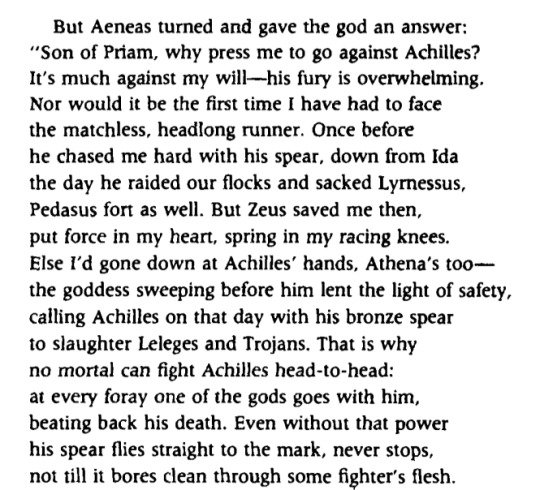
However, after a bit of back and forth and a ton of hyping up on Apollo's part, Aeneas decides to try anyway.
Like, what could possibly go wrong?
Achilles notices Aeneas charging at him and he begins to taunt him. It's something among the lines of: "I'm sorry, are you, background trojan character #61, actually gonna try and beat me? And then what? Do you think that Priam will reward you in some way? Maybe making you king after him? Well it's BULLSHIT, because Priam fucked so much that your chances of succeeding him are basically 0. Ahah. Loser."
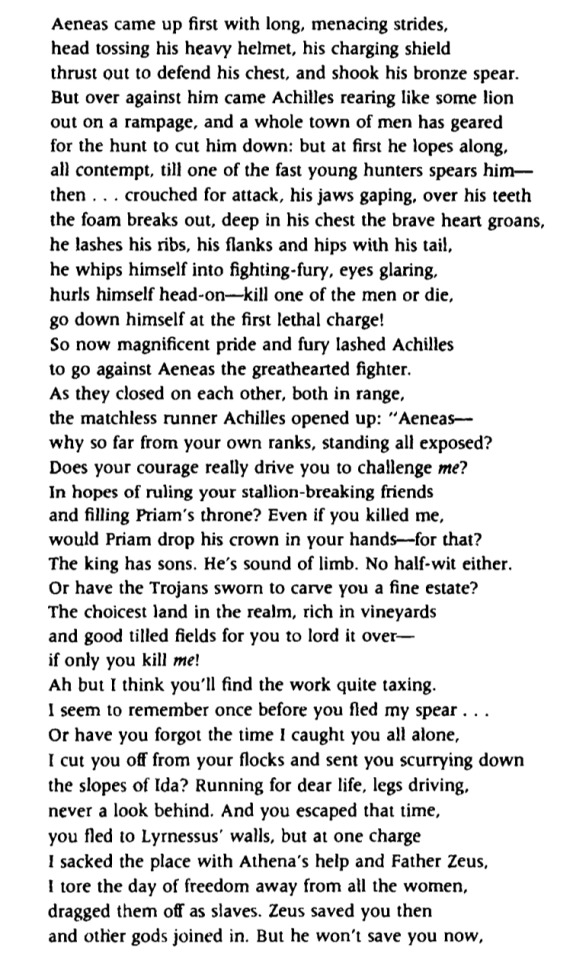
Now, you'd think that maybe Aeneas got enraged at the comment and attacked him, or maybe he even got scared and backed down, but NOPE. What does Aeneas do?
Well, first of all, he insults Achilles' insults, comparing his bickering to that of a child. Literally, "I heard third graders do better than that." And then he decides to list his and Hector's entire fucking family tree.
You know that part of the Bible that's like "this guy sired this other guy, and this other guy sired yet another guy" and so on? It's basically that.
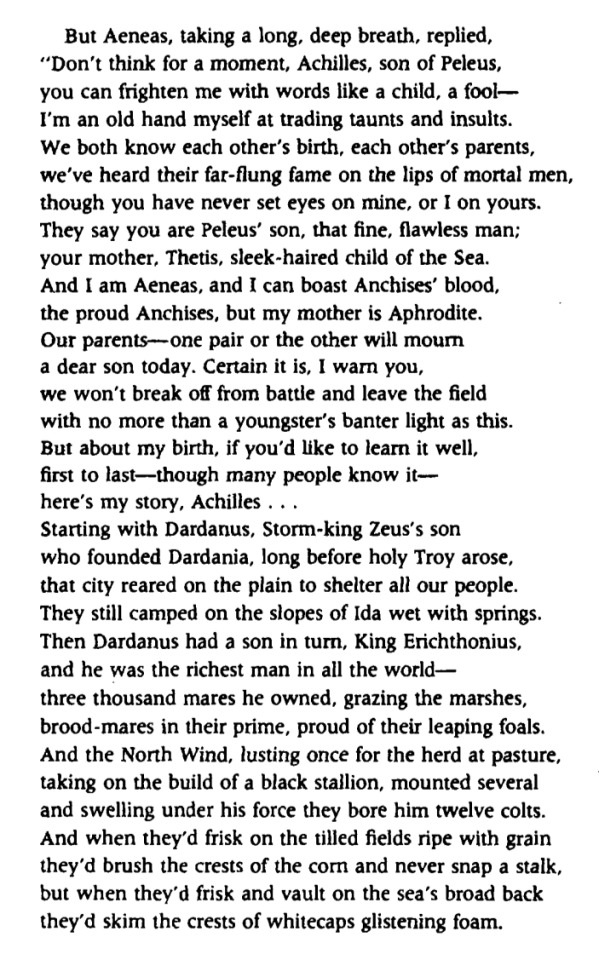
So after he's done with all that, Aeneas states that while he'd love to have a battle of insults with Achilles, because according to him he's actually very good at insulting people (his words, not mine), they should probably throw hands now. Achilles agrees.
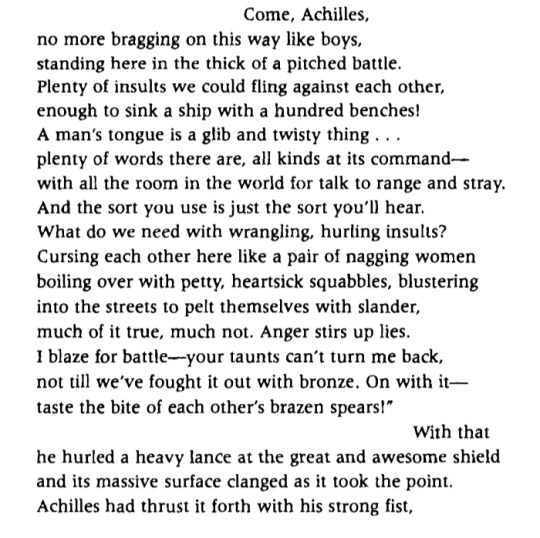
The duel is shortlived and Aeneas gets his ass handed to him. Badly. As expected. And he's about die when ✨️POV shift✨️ we're not on Olympus where Poseidon, Hera and Athena are watching this absolute train wreck go down.
Poseidon, pitying Aeneas, suddenly goes on a rant. It's something among the lines of: "come on guys, look at him, he's just a little guy! He literally has no stakes in this war, he doesn't deserve to die here! He even gives us lots of gifts and sacrifices, he's literally such a nice guy. How can we do this to him!?
...oh and also he's part of some prophecy, Zeus would get mad if he died."
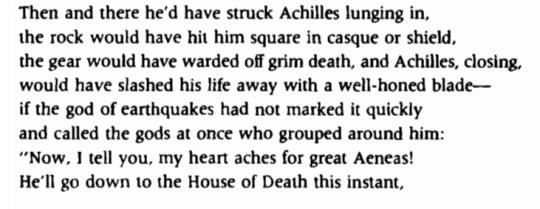
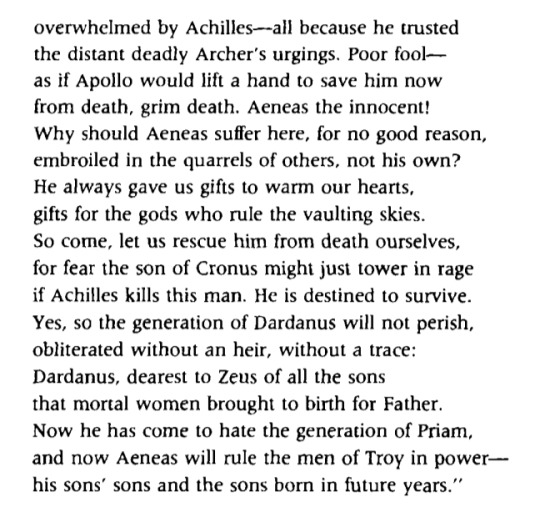
The fact that the way it's worded makes it sound like Aeneas being part of a literal prophecy is an afterthought to him absolutely floors me, Poseidon is literally just attached to a random dude that's fighting on the opposite side to his because he thinks he's nice.
After all that Hera is pretty unimpressed and states that she really doesn't care if our man lives or dies as neither her or Athena have ever saved a Trojan from death, she however adds that Poseidon is free to do whatever he wants.
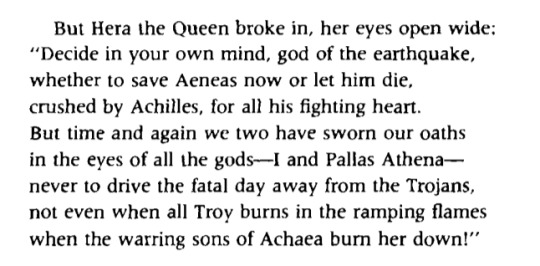
The literal moment Hera stops talking, Poseidon lunges down from Olympus and onto the battlefield to look for the two combatants. When he does, he saves Aeneas like only he can do.
You know how when Diomedes first tries to kill Aeneas, Aphrodite gently folds her hands around him to shield him? There's none of that here. Poseidon just runs up to him and literally flings the motherfucker.
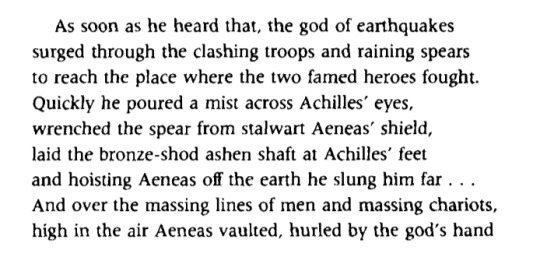
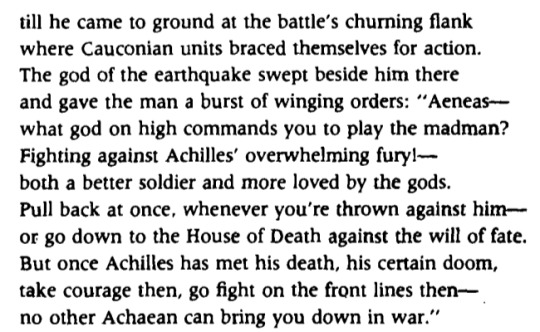
It literally says that he flies "high in the air". It's like a Looney Toons sketch.
So Aeneas lands and, while he's obviously a bit dazed, Poseidon proceeds to call him a madman and essentially tells him to never do something stupid like that again and just wait until Achilles is dead, then he'll be able to murder Achaeans to his heart's content. Aeneas is fine with that.
Achilles, who just saw his opponent just get yeeted into the fucking sky, just shrugs and goes "welp, guess that guy's off limits, I'm gonna go kill someone else now I guess lol".
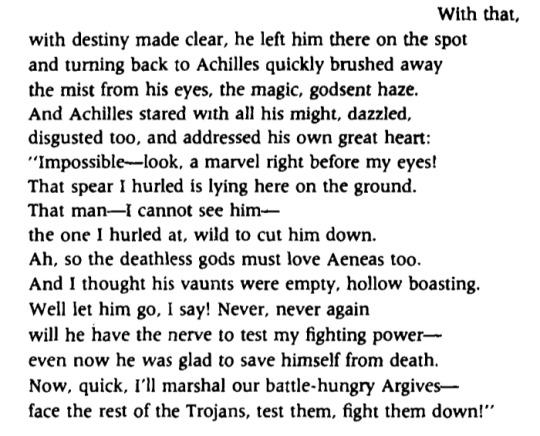
This entire scene is pure fucking gold and the fact that I've literally never seen anyone talk about it just breaks my heart.
1K notes
·
View notes
Text
1968 [Chapter 4: Zeus, God Of Thunder]

A/N: Can you believe we're already 1/3 done with this series?? I sure can't! I hope you enjoy Chapter 4. I'm so excited to show you where we're headed. The times are indeed a-changin'... 😉
Series Summary: Aemond is embroiled in a fierce battle to secure the Democratic Party nomination and defeat his archnemesis, Richard Nixon, in the presidential election. You are his wife of two years and wholeheartedly indoctrinated into the Targaryen political dynasty. But you have an archnemesis of your own: Aemond’s chronically delinquent brother Aegon.
Series Warnings: Language, sexual content (18+ readers only), violence, bodily injury, character deaths, New Jersey, age-gap relationships, drinking, smoking, drugs, pregnancy and childbirth, kids with weird Greek names, historical topics including war and discrimination, math.
Word Count: 7.3k
Tagging: @arcielee @huramuna @glasscandlegrenades @gemmagirlss1 @humanpurposes @mariahossain @marvelescvpe @darkenchantress @aemondssapphirebussy @haslysl @bearwithegg @beautifulsweetschaos @travelingmypassion @althea-tavalas @chucklefak @serving-targaryen-realness @chaoticallywriting @moonfllowerr @rafeism @burningcoffeetimetravel-fics @herfantasyworldd @mangosmootji @sunnysideaeggs @minttea07 @babyblue711
💜 All of my writing can be found HERE! 💜
You unzip the floral suitcase that Alicent gave the nurses to pack for you. Inside are the hundreds of greeting cards sent by people from the Atlantic to the Rockies; downstairs, Eudoxia is distributing a dozen bouquets of flowers throughout the house with appropriate grimness, and more arrive each hour. You lift cards out of the suitcase by the handful and lay them down on your bed. Every movement feels slow, every thought muddled, bare feet in cold wet sand that swallows you to your ankles. The windows are open, the sheer curtains billowing. The wind whips in off the ocean, smelling of brine and sun glare, life and death.
Aemond emerges from the bathroom in a gale of steam. He finishes adjusting his eyepatch and then dresses himself: white shorts, blue polo. Aemond wears a lot of blue. It is Greek, is it American, it is the Democratic Party, it is the color of the sky that was once believed to hold Olympus, it is everything he’s ever been or wanted to be. He’s humming The House Of The Rising Sun. It’s the first time you’ve truly been alone since the night before he caught his flight to Tacoma.
Beneath the greeting cards you find the books, cosmetics, and three new sundresses, none of which you ended up wearing home. Alicent bought you a plain black shift dress, matching gloves and flats, and opaque sunglasses to hide your face from the journalists who waited outside the hospital. And there is one last item to unpack. At the bottom of the suitcase is a clear plastic bag containing fabric, white dotted with bruises of common blue violets. At first you are confounded, and then you turn it over to see the dark, saturated stain of crimson. It’s the sundress you were wearing the day you were rushed to Mount Sinai to have Ari. The nurses hadn’t known if you wanted to keep it, burn it, bury it.
“Why didn’t you come back?”
Aemond’s brow furrows, like he’s surprised by the question. He goes to his writing desk and turns the chair around so it’s facing you. He sits, crosses one leg over the other, leans back and hides his hands in his pockets. His tone is gentle, but his gaze is hard. “By the time I heard that you’d had the baby, it was already over. You were out of surgery, he was in an incubator, and that was the immutable reality. I figured there was nothing I could do at that point to improve the outcome. And that’s true. Me flying back early wouldn’t have changed anything.”
“But you should have been there,” you insist, eyes wet, voice quivering. “You should have known him like I did.”
“Winning Washington was important.”
“Washington is a basket of votes, Ari was our child, he was real.”
“No one told me he was dying—”
“Because you didn’t pick up the fucking phone.”
Aemond is incredulous, like he couldn’t have heard you correctly. “It’s not like I was playing golf or drinking myself under some bar, I was campaigning 20 hours a day and it worked.”
“Nothing on earth could have kept me away from you when you got shot in Palm Beach.”
“So maybe it wasn’t just about Washington,” Aemond says, and his words aren’t gentle anymore. They are razored, dauntless, daring you to battle him. “It’s about the whole picture, it’s about the momentum. If I had underperformed in Washington, the dominoes would fall in Kentucky, and Utah, and Virginia, and then at the national convention in August, and then against Nixon in November. I don’t have the luxury of disappearing from the public eye to sit adoringly by your bedside when we both know there isn’t a single goddamn thing I can do to help.”
“It would have made you look like a better man.”
“But not a better president.”
And like a fracture being snapped back into place, you remember what Aegon said on that bloodstained night in Florida: You’re a vessel. You’re a cow. And one day he’ll be done with you. You stare down at the ruined dress entombed in plastic, still clutched in your hands. You don’t dare to let Aemond see your eyes. You’re afraid you won’t be able to disguise the betrayal glistening there. You ask, a whisper, a whimper: “Why aren’t you sad?” I thought you loved him. I thought you were always so worried about him.
“Of course I’m sad,” Aemond says, more kindly now, patiently, like he’s speaking to someone who can’t be expected to comprehend. “But it’s different for the mother.”
You can’t reply. If you do, something lethal will pour out, smoke and poison and arrows, something that shoots to kill. Ari was quietly interred at the Targaryen family mausoleum in Saint George Greek Orthodox Cemetery in Asbury Park. It had felt so wrong to leave his tiny casket there in a silent stone prison full of strangers.
Aemond is behind you now, trying to knead the tension out of your shoulders. And for the first time in two years, you wish he’d stop touching you. Your belly hurts, your head hurts, your heart hurts, you are a garden blooming with bruises and scars. “I know you aren’t in your right mind. Everything will be better soon. I promise.”
Tears gather on your eyelashes. “I miss him.”
“We’ll have others. Here, let me take that…” Aemond grabs the bag holding your ruined dress and it’s out of your reach before you can think to resist. “You should get ready for dinner.”
“Okay,” you reply numbly, now gazing down at your empty palms. Aemond leaves with his grisly parcel, and you never see it again. But once he’s gone you don’t shed your black mourning dress, blood-soaked pad, bandages, and shake loose your hair and step into the shower. Instead, you walk around the bed to pick up the mint green rotary phone on your nightstand. You speak to a series of operators before you reach the Harbour Rocks Hotel in Sydney. While you listen to the ringing through the intercontinental wire, you sit down on the bed. You’ve never felt low like this. You’ve never felt so unmoored from everything you had believed about your life.
A gruff, familiar voice answers. He’s just waking up, slurping on his morning coffee, dabbing his moustache with a napkin. “Hello?”
“Daddy, I don’t think I’m where I’m supposed to be.”
“What?” he asks, and immediately he is no longer groggy but desperately concerned. Your parents are away on a month-long tour of Australia and often incommunicado. By the time they received news of Ari’s death and called Mount Sinai in hysterics to speak with you, you had told them not to rush home. You were about to be released, and they would not make it in time for the funeral regardless. Aemond insisted on a swift, private ceremony, a detour on the drive back to Asteria, like it was something he couldn’t wait to put in his rearview mirror. “What are you talking about, sweetheart?”
“Aemond, he…” He’s not the man I thought he was. I don’t know him, I don’t trust him. “He’s not acting right, he’s not…he didn’t…Daddy, it’s like he doesn’t care. And I don’t want to be here anymore. Can I fly down to Tarpon Springs when you and Mama get back? Can I stay with you for a while? And then…and then…” You don’t even know what words you’re looking for. They don’t exist in your universe.
“Listen, honey,” your father says with great tenderness. “Are you listening?”
“Yeah.” You’re trying to stifle your sobs so no one downstairs hears you.
“You’ve just been through something terrible. So terrible I can’t even imagine it. And of course you’re feeling out of sorts. But Aemond is your husband, he’s your protector and your ally, your best friend, your partner in life. He’s not the one responsible for what happened. You can’t misdirect your heartache at him.”
“But he’s…Daddy, there’s…there’s something wrong with him.”
“Oftentimes, it’s easier for women to talk about their emotions, both good and bad. But for men—especially men like Aemond who are so self-disciplined by nature—it can be like pulling teeth to express themselves. They don’t like to be vulnerable. They actually think they’re failing in their commitments to their wife if they let her see how much they’re struggling. Aemond is hurting just like you are. He might not show it in the way you expect, but that doesn’t mean he doesn’t care. Of course he cares.”
How do you know, Daddy? Have you cut him open and studied his brain, his ropy nerves, the dark chambers of his heart? “I thought he saw me like you see Mama, I thought he included me in everything because he loved and respected me, but that’s not it. He just needs someone to help him get elected, that’s all Ari and I were to him, and I can’t…I just can’t…the thought of him touching me now…”
“Sweetheart, Aemond is a good man,” your father says. “He does love you. He does respect you. And he’s doing such incredible things for this country. I have friends in Florida who’ve been voting Republican since Hoover, but they’re crossing over for Aemond. They think he’s the one to clean up this mess. Vietnam, poverty, civil rights, the riots, the shootings, the hippies, the drugs, the Russians, the Chinese, someone has to pick up the pieces and create something that makes sense. Do you think Nixon or Humphrey would end the war by this time next year? Do you think either of them would compel the South to enforce voting rights or desegregation?”
“No,” you say, closing your eyes. But that doesn’t mean I can forget what I’ve learned about Aemond.
“Here, your mom wants to say something.” Your father vanishes; your mother’s voice comes piping across the copper submarine cables that span the length of the Pacific Ocean. You wonder—randomly, distractedly—if any of the wires connecting you to Sydney run through Arizona, the place Aegon told you he didn’t want to leave.
“Hello? Are you there?”
“I’m here, Mama.”
“Oh, honey,” she sighs, distraught, hearing the exhaustion and misery in your voice. “You’ve got the baby blues, and no baby to hold good and close to help them run their course. I’m so sorry. It’s just awful, so awful.”
You speak before you know what you’re going to say. “I don’t want to be married to Aemond anymore.”
“You’re confused, sweetheart. Your hormones are all over the place, you’re in pain, you’ve just had major surgery, and after this year with all the stress from the campaign and that horrific shooting in Palm Beach—”
“He’s not like Daddy.” Tears are flooding down your cheeks; your voice is hoarse. “I thought he was, but he’s not.”
“You cannot make a mistake like this,” your mother says, and she’s turned from silk to steel. “If you do something drastic now, you’ll wake up in a month or six months or a year and realize you’ve ruined not just your life, but the chance this country had at a better future. Don’t you realize what’s at stake here? Every marriage goes through tough times. Every husband needs to learn how to care for his wife, and every wife how to best support her husband. That’s natural, and you’ve only been married two years. Of course you and Aemond are still learning how to navigate life together. It only seems so much worse because of what’s happened to the baby.”
Is she right? Am I wrong? “I don’t know,” you say weakly.
“If you leave now, what happens?” your mother demands. “You abandon the campaign and Aemond’s support plummets. You are a divorcee, a sinner, a failure. You don’t get your son back. But you do lose everything you’ve helped build. Marriage isn’t an experiment, ‘oh let’s give it a try and if we hit any bumps we’ll call the whole thing off.’ No. It’s a covenant. Marriage is for life.”
Yes it is, in just about every faith, and certainly for the Greek Orthodox Church. You are suddenly consumed by mistrust for your own body, this flesh that failed your son and now is deceiving you with doubt so heavy—like cold iron or lead or platinum—it masquerades as truth. How could you imagine a life after Aemond? What waits for you in Tarpon Springs besides the promise of an eventual remarriage that is banal, powerless, bleak, exactly what you’ve always plotted so willfully to avoid?
“Do you understand me, honey?” your mother asks, and she’s soft and kind again. “I don’t mean to be strict with you. My heart breaks for you, and I love you. I’m not trying to upset you. I’m trying to protect you from yourself.”
“Yes.” There are people getting massacred in Vietnam right now; there are people who can’t afford roofs over their heads. Who am I to complain? Your tears have stopped; your breathing is now slow and measured. “Yes, Mama. I understand.”
After you’ve hung up, you stay where you are for a long time, your hands folded limply in your lap and gazing at the paintings hung on the pale blue walls: small replicas of The Birth of Venus, Romulus and Remus, Prometheus Bound, Perseus Rescuing Andromeda, Echo and Narcissus, Jupiter and Io. Then you get up to sift through the greeting cards you’ve piled on the bed, not really seeing them. Only one captures your attention. Only one jolts you out of the fog like a flash of lightning through dark churning clouds.
You take the card Aegon gave you back when you were still a mother and set it upright on your nightstand, consider it for a while, wander into the bathroom to scrub the despair from your skin and change into something less somber for dinner.
~~~~~~~~~~
You’re playing Battleship with Cosmo by the edge of the swimming pool while all the other children splash around, howling with laughter and diving for toys they throw to the bottom and then fetch with their teeth like golden retrievers, G.I. Joes and Barbies and Trolls and even a waterlogged Mr. Potato Head. The nannies are observing intently, poised to leap in if anyone should appear to be at risk of drowning. If Ari had lived, I wouldn’t have wanted nannies to raise him, you think. I would have wanted him to have a normal childhood. I would have wanted to know him.
“Your turn,” Cosmo says with a grin. He’s the one who looks the most like Aegon, or how you imagine Aegon must have looked before the pills and the booze and the long caged decades. His hair is so light a blonde it’s nearly white, his eyes huge and glimmering and mischievous. Battleship is a bit advanced for a five-year-old. Cosmo keeps guessing the same coordinates over and over, so you periodically lie and tell him he’s sunk one of your ships. When you launch a successful attack against his, he seems to think it’s fair game to relocate the vessel to a more advantageous location.
“D7.”
He picks up his aircraft carrier and repositions it. From the record player drifts California Dreamin’. “Nope! Nothing sank!”
“Wow. I’m so bad at this.”
Cosmo is snickering. “Yeah, you are. Really bad.”
“If I got drafted, the Army would be better off leaving me at home. I’d just be a nuisance.”
“What’s drafted?”
“Never mind. Your turn to guess.”
“J12!”
The grid only goes up to 10. Nonetheless, you slap your own forehead dramatically. “Oh no, not again! You sunk my battleship!”
“Yay!” Cosmo cheers, then turns to the Jacuzzi. It’s brand new, just installed last month. “Mom, did you see? I’m winning!”
You glance over at Mimi. She has passed out, her latest Gimlet drained and her head resting atop her crossed arms, propped on the rim of the Jacuzzi. “Uh, Cosmo, run inside and ask Doxie to make you a peanut butter and jelly sandwich, okay?”
“Okay.” He scampers off, toddling on reckless little legs.
With no shortage of difficulty, you manage to stand. Each day your abdominal muscles feel less like they’ve been shredded and then mended with threads of fire, but the pain is still bad, very bad, and there are spots of skin on your belly that are numb when you skim your fingertips across them. You will have a long vertical scar like Aemond’s, an irreparable reminder of the blood you’ve paid to the cause. And for all your anguish, this particular fact doesn’t torment you. It is proof that Ari existed, however briefly, however futilely.
You amble over to the Jacuzzi, your roomy lavender dress flowing in the wind, and shove one of Mimi’s shoulders. “Mimi, wake up. Get out of the water.”
She mumbles incoherently in response. You reach for her before remembering you can’t lift anything. You look around. Alicent and Helaena are on lounge chairs at the other end of the pool; Alicent is trying very hard to look interested while Helaena shows her about 100 different butterfly species pictured in a kaleidoscopically colorful book. Criston is off giving Ludwika a tour of the property, flanked by a flock of Alopekis hoping for treats. Ludwika is Otto’s wife of six months but only newly arrived, 30 years old, perpetually unimpressed, modelesque, golden blonde, if Barbie was from Poland. Aemond, Otto, and Viserys—his sparse threads of silver hair hanging like cobwebs around his gaunt face, grimacing and clutching the armrests of his wheelchair—are conspiring on the lawn between the main house and the pool. They haven’t noticed your predicament. Fosco is sauntering by wearing some of the tiniest swim shorts you’ve ever seen. He is the son of an Italian count, gangly and chatty and from what you’ve seen almost certainly addicted to gambling.
“Will you help me move Mimi, please?” you ask him. “I’m afraid she’s going to drown.”
“Of course, of course, no problem. Let me handle it. Do not hurt yourself.” He has her half-dragged out of the Jacuzzi before Mimi startles awake.
“What’s going on?” she slurs. “Put me down, I can walk.”
“I doubt it,” you say.
“You are alright?” Fosco asks Mimi as he steadies her on the cement, wet with pool water. She clutches at his forearms helplessly.
“I’m fine. Absolutely fine.”
“Mimi, go inside,” you say. “Eat a sandwich. Tell Cosmo you’re proud of him for winning Battleship.”
“Battleship? Well, that’s just ridiculous. He’s five. Five-year-olds can’t play Battleship.”
“And yet you will congratulate him regardless.”
She can feel your impatience, your judgement, sharp like wasp stings. Mimi retreats like a kicked dog to the main house, somehow summoning the will to remain mostly upright.
You look to Fosco. “Do you know where Aegon is?” You want to see him, but you also don’t; each time you’re in the same room now is a disorienting storm of familiarity, curiosity, painful reminders, annoyance, awkwardness, longingness to again feel as close to him—to anyone—as you did during those fleeting moments at Mount Sinai Hospital in Manhattan.
Fosco chuckles. “Where is he ever? Napping, sailing, drinking, on the phone with one of his lady friends. I could not say. I have not seen him recently.”
“Okay. Thanks anyway.” The music stops—the record needs to be flipped over—and now you can just barely hear what Aemond, Otto, and Viserys are discussing.
“And you criticized me for going too young,” Aemond says to Otto. “What’s your age difference with Ludwika? 40 years?”
“She’s good publicity. She defected from the Eastern Bloc in search of the American Dream.”
“Being married to you?” Aemond quips. “I think she found the American Nightmare.”
“Speaking of wives,” Otto continues. “I assume since yours had one surgery, that’s how all the future children will need to be born, is that right?”
Aemond nods, frowning. “Yeah. And the doctors said she shouldn’t have more than three. It weakens the uterus, I guess, all that slicing and suturing. Do it too many times and ruptures get more likely, and those can be fatal.”
“Very unfortunate,” Viserys rasps. “Children are our greatest legacy. I wanted at least ten, but your mother…well…after Daeron, it just never happened again.” And you know that this is just one of the ways in which Aemond had planned to win his father’s admiration: by contributing more new Targaryens to the dynasty than anyone else. Now that’s impossible.
Otto sighs wistfully. “To have a brand new baby to parade around in the fall…that would have been wonderful.” For the first time in two years, you can sense that you have disappointed him. Fosco is watching you, uneasy, ashamed, sorry without knowing what to do about it.
“Absolutely,” Aemond says, as if this is not the first time the thought has crossed his mind. “But it’s done now. There’s no sense in dwelling on what might have been. We must look forward. It’s feasible that…well…if we try again and get good news by October, we can announce in time for Election Day…”
You can’t listen anymore. Your belly aching, your bare feet hurrying through warm emerald grass, you traverse the lawn and disappear into Helaena’s garden, painstakingly tended and continuously expanded since she was a little girl. There are marigolds and daffodils, tulips and roses, azaleas, asters, butterfly bushes, chrysanthemums, lilies and lupines, sunflowers, violets, life blooming in a hundred different shades. There are tiny statues too, tucked away in random places, stone angels and untamed creatures, alligators and turtles and rabbits and cats, the only sort the Alopekis will tolerate. At the very center of the garden is a tall circle of hedges with only one opening, an arched doorway cut into the thick lush green. You’ve been here before, though only with Aemond. On a property shared with so many family members—and the occasional intrusive journalist—it’s a good place to escape prying eyes. You pass through the threshold with a hand resting absentmindedly on your belly, as if you’re still pregnant. You keep doing this. Each time you remember you’re at the end of something rather than the beginning, it carves you open all over again.
Around the inside perimeter of the circle are twelve sculptures positioned like numbers on a clock: eleven Olympians and Hades, confined to the Underworld. In the middle of the clearing is the largest stature of all, a wrathful Zeus hurling lightning bolts and surrounded by a gurgling fountain of glass-clear water. Under the shadow of Zeus, Aegon is sprawled on the ground and smoking a joint. “So you’re hiding from them too, huh?” He gives you a sly, welcome-to-the-club smirk, then offers you his joint. “Want a hit?”
You shake your head, not taking another step towards him. “I shouldn’t have done that.”
He is confused. “Done what?”
“Any of it.” I told him about my life before. I made the mistake of thinking I could go back.
Aegon still doesn’t seem to understand. “You’re scared I’m gonna snitch?”
You shrug, evasive. It’s not just the fact that he knows. It’s the sensation that you’ve unlatched something—an attic room, a jewelry box, a birdcage—and now you can’t get it locked again, and the door rattles with every footstep and storm wind, and you are no longer Aphrodite or Io but Pandora, a hunger growing in your stitched womb like a child.
“What? What’s wrong with you?” And that’s always how he says it, not what’s the matter or are you alright or what did I do or how can I fix it?
“I’m kind of…embarrassed, I guess.”
“Embarrassed,” Aegon echoes. “Because of me?”
“I feel like I said and did a lot of things that were out of character because I was emotionally compromised.”
“They were out of character for who you’ve been trying to convince everyone you are since you married Aemond, sure. But they weren’t out of character for you.”
He’s treading too close now, arrows piercing their mark, a tremor near the epicenter. “You don’t know what you’re talking about.”
“Au contraire, I have acquired many interesting revelations recently.”
“Where’d you learn French? From Mimi?”
His smile dies. “Boarding school.”
You don’t know how to reply. You don’t know how to be around Aegon without either hating him or letting him see parts of yourself that you’re trying to drown like Icarus in the waves. You glance yearningly towards the doorway cut into the hedges.
All at once, Aegon is furious. “You don’t want to talk to me? You want to go back to how it was before, you want to pretend Mount Sinai never happened? Fine. You got it. Wish fucking granted. Whatever you have to do.”
He turns away from you. You flee from him. But that night when Asteria is hushed and still—Aemond, Criston, and Otto are attending a fundraising dinner in Philadelphia, and you are temporarily excused from accompanying them as you recover—you creep down into the basement of the main house to apologize. Mimi sleeps in a bedroom on the second floor, but here Aegon can keep odd hours and drink and smoke to his heart’s content, and even entertain clandestine guests, girls who are beautiful and giggling and never invited twice.
Aegon isn’t here. He might be passed out somewhere, or at a party, or maybe even upstairs with Mimi, and something about this idea twists through your mending guts like a blade. In his absence, you take a quick look around his room, something you’ve never done before. You hadn’t had any interest; it wouldn’t even have occurred to you. There’s a large green futon, a matching shag carpet, a television, a bookshelf full of notebooks and paperbacks—Kurt Vonnegut, Harper Lee, Sylvia Plath, Truman Capote, Ken Kesey—and vinyl albums, a record player, and his two acoustic guitars. The first is unpainted maple wood covered with stickers. I’d rather be nowhere reads one; Burn pot not people proclaims another. The second guitar is the souvenir he bought in Manhattan, an aquamarine blue six-string.
There's something strange on his end table. Along with a dozen empty cups is a full ashtray, and there’s a folded piece of paper tucked underneath. You slide the paper out and open it. It’s the receipt you used to solve the long division problem in your hospital room.
Why would he keep this? you think, mystified. There are footsteps above your head, and you quickly return the receipt to where you found it and leave before your trespass can be discovered.
When you emerge from the basement, Fosco is waiting in the hallway and carrying a Tupperware container filled with something that resembles kourabiethes, Greek shortbread cookies. “I thought I saw you sneak down there. What were you looking for?”
You scramble for an explanation. “One of the dogs is missing. Alicent wanted me to check the basement.”
“Ah, yes, I see.” He passes you the Tupperware container. “These are for you. I hope they are not too bad. I baked them myself.”
“Are they…” You shake it. “Biscotti?”
“They are ossi dei morti,” Fosco says. “Bones of the dead. We make them to remember loved ones we have lost. They are hard, so you should dip them in coffee or tea before you try to eat them.”
You open the lid. Inside are long thin cookies coated with powdered sugar. You inhale almond flour, cloves, cinnamon. And you are so touched you cannot find your words.
“You know, there still places in Italy where mothers wear black for years to mourn their children.” This is not trivia; it is an acknowledgement. Your son is gone. There is no shame in the grief that is left behind. In another house, it would be expected, it would be required.
“Thank you, Fosco.”
He smiles warmly. “We are in this together, no? We are pieces of the same machine.”
Then he plods off towards the living room, sliding a rolled-up horse racing program out of the back pocket of his tight plaid pants.
~~~~~~~~~~
You’re in Louisville, Kentucky, where thunder quakes the eaves. An hour ago, Aegon was popping Valium and leisurely plucking at his pool water blue Gibson guitar, slumped against the wall, nipping at a flask filled with straight Bacardi. But he’s not anymore. Now he’s gathered around the small color television with you, Criston, Otto, Fosco, Helaena, and Ludwika. The news is just breaking. There was a civil rights protest at the University of Kentucky in Lexington one hour to the east. Someone threw a rock, or someone claims someone threw a rock, or someone threw something that was mistaken for a rock, and in any event the situation escalated from there and local police who were monitoring the demonstration opened fire on a crowd, killing five students and injuring another dozen.
Outside, word is spreading through the crowd of over 2,000 people that have gathered for Aemond’s planned speech at the historic Iroquois Amphitheater, a New Deal project finished in 1938. Rain is pouring, and the venue has no roof. Aemond is already 20 minutes late. The voices are becoming louder, more demanding, more wrathful. They’re shouting that Aemond is too afraid to face them now, that he’s trying to figure out what his statement will be, that he’s cowardly and calculating; and if President Lyndon Baines Johnson was here tonight instead of cursing his bad stars up in Washington D.C., he would certainly have something to say about the capriciousness of voters who love you, hate you, carry you higher, drag you down, all without ever knowing you.
In truth, Aemond is not stalling on purpose. He’s in the bathroom trying to get his prosthetic eye in. It’s been giving him hell all afternoon. He wears his eyepatch at home, but he’s never made a public appearance without his glass eye clean and perfect in his voided socket.
“He’s going to have to say something about it,” you tell the others as you watch the news coverage.
“Say what?” Otto snaps. “If he doesn’t treat those dead kids like martyrs he’s going to get booed off the stage. If he condemns the police he’s going to lose the suburbs. They’ll run to Humphrey now and Nixon in November.”
The weather report called for storms—which is why Alicent, Mimi, and the children are already back at the Seelbach Hotel for the night after a long day of shaking hands and smiling gamely—but no one expected it to get this bad. The room you’re huddled in is just off-stage, so you can see it all: the wind ripping signs and flags from people’s hands, drenched clothes, sopping hair, snarling faces, rain turning puddles to rivers. The stomping of boots is now as loud as the thunder. Rocks and bottles are being pitched at the stage.
“Is America always like this?” Ludwika asks, scandalized.
“No, not at all,” Otto says. “Goddamn animals…”
Aegon replies, not taking his eyes from the television: “You’d be mad too if cops were shooting your friends and the only graduation present you had to look forward to was getting disemboweled by guerillas in Vietnam.”
“I’ve had it with you and your Marxist bullshit! You want to liberate the dispossessed masses? Why don’t you start by donating your monthly drugs and rum budget to the—”
“We should cancel,” Fosco says. “Just call the whole thing off. Tell them Aemond is sick or something.”
“That’s the headline you want? ‘Senator Targaryen hides from grieving supporters who braved a thunderstorm to see him’?! Just give the White House to Nixon now!”
“I don’t think we can cancel,” Criston says softly. “I think if we tried to leave, they’d swarm the car.”
“It’s a riot,” Otto moans, rubbing his face with his hands. “This is what happens when you court voters like this, college kids and hippies, professional malcontents…”
“Aren’t there police outside?” Ludwika says anxiously.
“Yeah, a handful,” Criston tells her. “And if they try to do anything this will erupt and we can add to the body count in Lexington…”
You leave them and follow a hallway to the men’s bathroom; on the periphery of your vision, you can tell that Aegon is watching you go. You push the door open and find a row of stalls and three sinks, one of which Aemond is standing in front of as he stares into his reflection and attempts to shove the prosthetic eye into his empty, gore-red left socket. His suit is navy blue, his hair neatly slicked back, his shoes so polished they’re reflective like a mirror.
“Fuck,” he hisses, flinching. His right cheek is wet with tears of frustration and agony. It’s July 26th, and tomorrow are the final three state conventions in the Democratic primary. Humphrey is almost certain to take Utah; Virginia will go to Governor Mills Godwin, who is only running in his home state to control the delegates and will hand them over to whoever he feels is most worthy in August. But Aemond is the favorite to win here in Kentucky. Or at least, he was an hour ago.
“What can I do? What do you need?”
“You can’t do anything. It’s…it’s this goddamn nerve pain, it feels like I’m being fucking stabbed, I can’t get the muscles to relax enough…”
Like an apology, you say: “Aemond, the crowd is getting out of control.”
“So you came in here to rush me?”
“No, I’m here to help.”
“You’re not helping. You’re doing the exact opposite.”
“I think you should give this speech with your eyepatch on. It looks good, and you’ll be as comfortable as possible, and the crowd won’t have to wait any longer than they have already.”
“No.”
“Aemond, please—”
“No! FDR didn’t make speeches in his wheelchair and I’m not making mine without my eye in.”
“Do you want me to get you Aegon’s pills? Rum, weed?”
“You don’t think I’ve already taken something?” He tries to force his eye in again and strikes his fist against the sink when he can’t.
Then you ask gingerly: “Do you know what you’re going to say about the shooting?”
“Get out!” Aemond shouts. “You’re making it worse, just get the fuck out! Go!”
You bolt from the bathroom, hands trembling, throat burning. You don’t want to return to the television where the others are standing; you’re worried they’ll be able to tell how upset you are. You go to the edge of the stage, arms crossed protectively over your chest, and peek out into the crowd. Above their chants and jeers and howled threats, lightning splits the sky.
I don’ t think we’re going to be able to find our way out of this one. I think this is the end of the road.
“Hey,” Aegon says, tapping your shoulder. “Back up.”
“I’m fine here.”
“No you’re not.” He grabs your arm and tugs you farther backstage. Seconds later, an Absolut Vodka bottle explodes into crystalline shrapnel where you were standing. You yelp and Aegon gives you a little eyebrow raise. I told you, he means.
“Someone has to go out there,” Otto says, still lurking by the television. Fosco is comforting Helaena, who is quietly weeping; Ludwika is watching the news coverage in horror, surely reconsidering all her life choices. A sixth University of Kentucky student has been declared dead. “We can’t wait.”
“No we can’t,” Criston agrees. Then they both turn to you expectantly.
Your blood goes icy. Tonight was meant to be your first official appearance since the baby. Your hair is up, your dress a navy blue to match Aemond’s suit, gold chains around your wrist and throat, a gold chain of a belt. You thought you were ready. But it wasn’t supposed to be like this.
“Don’t you look at her,” Aegon says, sharp like a scalpel, like a bullet, like something that punctures arteries and lungs. “They’re throwing glass. You figure something else out, don’t even look at her.”
Otto relents, perhaps halfheartedly. “No, you’re right. I don’t know what I was thinking.”
Criston starts heading for the bathroom to get Aemond. Otto is watching the television again, his face vacuous as his ambitions are carried away by a flood of rain, wind, rage, blood. Aegon snatches his guitar from where he left it by the wall. He tosses the strap over his head, gives the strings a few experimental strums and retunes them, starts walking towards the stage.
“Aegon, what are you doing?” you ask, panicked.
“Someone has to distract the crowd.”
“No, stop, you can’t—”
“Hey,” Aegon says. And when you glance past him at the uproarious, storm-drenched frenzy, he turns your face back to his to make sure you’re listening. His hand is insistent but gentle, his voice steady. “Don’t go out there. Okay?”
“Okay,” you agree, startled.
He gives you one last small, parting smile, a flash of his teeth, a daring glint in his murky blue eyes. Then he’s out in the torrential rain, soaked to the skin in seconds. His frayed green Army jacket clings to him; his hair is ravaged by the wind. As he takes his place behind the microphone, a stone that someone has hurled skates by him and nicks the apple of his left cheek. You can see a trickle of blood snaking down his sunburned skin before the rain washes it away; you feel a desperate gnawing dread that someone will hurt him, not just here but anywhere, not just now but ever. The crowd is still seething, shouting, stomping their feet to join the inescapable growl of the thunder. Aegon’s pick flies over the guitar strings as he begins playing, raindrops cast from his fingers like spells. At first, you can barely hear him.
“Come gather ‘round, people, wherever you roam
And admit that the waters around you have grown
And accept it that soon you’ll be drenched to the bone
If your time to you is worth saving
And you better start swimmin’ or you’ll sink like a stone
For the times, they are a-changin’”
The audience is settling down now. Some of them are singing along. You can feel that Otto, Ludwika, Fosco, and Helaena are gathering around you, but you don’t grasp anything they’re saying. You can’t tear your eyes from Aegon. It’s like you’re seeing him for the first time, this radiant sunbeam of a man, a light in dark places, a constellation that whispers myths through the ink-spill indigo of the night sky. How could you ever have hated him? How could you ever have thought he was worthless?
“Come writers and critics who prophesize with your pen
And keep your eyes wide, the chance won’t come again
And don’t speak too soon, for the wheel’s still in spin
And there’s no tellin’ who that it’s naming
For the loser now will be later to win
For the times, they are a-changin’”
Aemond and Criston appear beside you at the edge of the stage; Aemond’s prosthetic eye has at last been successfully placed with no lingering evidence of a struggle. You expect him to apologize for what he said in the bathroom, but he doesn’t. Instead he says when he sees Aegon: “What the hell is he doing?”
“Saving your career,” you reply simply.
“Come senators, congressmen, please heed the call
Don’t stand in the doorway, don’t block up the hall
For he that gets hurt will be he who has stalled
The battle outside raging
Will soon shake your windows and rattle your walls
For the times, they are a-changin’”
Now Aegon peers pointedly off-stage to where Otto Hightower is gawking. Aegon beams, throws his head back to get his dripping hair out of his eyes, comes back to the mic.
“Come mothers and fathers throughout the land
And don’t criticize what you can’t understand
Your sons and your daughters are beyond your command
Your old road is rapidly aging
Please get out of the new one if you can’t lend your hand
For the times, they are a-changin’”
Everyone you can see in the crowd is singing and swaying. It’s not just a Bob Dylan song from 1964 but an anthem, a prayer, a rallying cry, a dire warning for the powers at be.
“The line, it is drawn, the curse, it is cast
The slow one now will later be fast
As the present now will later be past
The order is rapidly fading
And the first one now will later be last
For the times, they are a-changin’”
The audience is applauding and whistling. Aegon steals a glimpse of where you are standing backstage, checks that Aemond is still there with you and that he’s ready.
“Ladies and gentlemen,” Aegon broadcasts with a wicked grin. “I am now proud to present the next president of the United States of America, Senator Aemond Targaryen!”
And Aemond is crossing the stage, no trace of pain or self-consciousness or prey-animal fear, no mere mortal but someone chosen by the gods, and the rain is slowing to a drizzle, and the clouds are opening to let through rare pinprick aisles of daylight, and the riotous spectators are now his disciples, exorcised of any rage they’ve ever felt for the scarred senator from New Jersey. He and his family are not the enemy; they are the solution. They are revolutionaries who have bled for the cause. They bring with them the change that is required. Aegon steps back and the rest of you join him in a semi-circle like a crescent moon behind Aemond. When you walk out onto the stage, the cheers swell to screams.
Aegon takes off his guitar and then leans into you. “He’s lucky you aren’t 35,” Aegon whispers, soft lips that curl into a smile as they brush your ear. And he’s teasing you but he’s not mocking, he’s not mean. He’s so close you share the same atmosphere, the same gravity. “Maybe when he finishes up his second term you can start building your resume for your first.”
“I want your endorsement.”
“From the disgraced former mayor of Trenton? What an honor. You’ll have to fight for it.”
You ball up a fist and playfully bump your knuckles against his chin. He pretends to bite at you. And you laugh for the first time since a doctor and priest entered your hospital room 13 days ago. Aegon slings an arm around your shoulders, pulls you against him, soaks you in his rain.
“Today in Lexington, we lost six brave and brilliant souls,” Aemond says, his voice booming through the amphitheater. A hush ripples through the crowd as they listen, enraptured. “Their sacrifice was for the most noble of causes, but they should never have been forced to pay the ultimate price. They deserved long, full lives in a better America than the one we now call home. This tragedy is a symptom of the sickness that has infected this nation, a fatal failure to empathize with our fellow countrymen, a deafness to pleas for justice, a blindness to mercy. But the remedy is within all of us, for it is our own humanity. When we purge the diseases of war, prejudice, and ravenous greed, we will reclaim our best selves—our true selves—and our nation will at last be cured.”
The amphitheater is illuminated with not only strobing lightning but the flashbulbs of cameras. The journalists have arrived just in time.
#aegon ii targaryen#aegon targaryen#aegon targaryen ii#aegon ii#aegon targaryen x reader#aegon x reader#aegon x y/n#aegon x you#aegon ii x you#aegon ii x y/n#aegon ii x reader#aegon ii targaryen x reader#aegon ii fanfic#aegon ii fic
179 notes
·
View notes
Photo

#Hercules & Xena#The Battle for Mount Olympus#Hercules and Xena#Lucy Lawless#Kevin Sorbo#Lynne Naylor#John Loy#VHS#90s
235 notes
·
View notes
Text
⚠️Vote for whomever YOU DO NOT KNOW⚠️‼️


#ultimate obscure blorbo#polls#round 2#Tethys (Hercules and Xena: the Battle for Mount Olympus)#The Amazing Volta (Stone Junction: an Alchemical Potboiler)
36 notes
·
View notes
Note
Can i request a jason grace x reader who is a daughter and champion of posedion?? Like how he's the champion of hera and r is the champion of posdeion :3
✮⋆˙ will you be a champion with me?; jason grace x daughter of poseidon! reader blurb
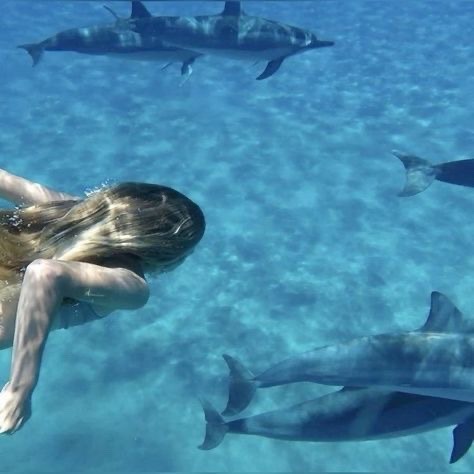

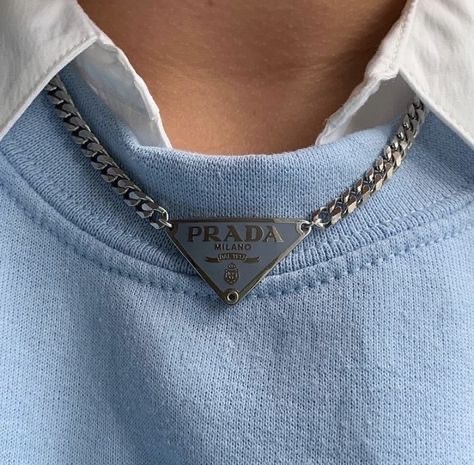
content: jason grace x daughter of poseidon! reader blurb
warning: none!
author's note: i tweaked it just the slightest bit because something about them being the champions of their father's wives has me sappy.
you were poseidon's beloved daughter, but his wife's darling champion. amphitrite had taken a fondness to you from the moment you were born, unable to be mad at poseidon for his infidelity as it created such a sweet girl. she had no problems flaunting her affections towards you; every year for your birthday, stunning earrings made of shells or gold rings depicting waves finding their way to your doorstep. from the moment you were born to your last breath, you'd be amphitrite's champion.
similar, hera - juno, whatever - had staked a claim on one of her husband's children. jason grace, his roman son, had quickly become her champion as well. and, upon hearing this news, amphitrite sought out the queen of the gods, eager to discuss their champions. it wasn't so much of a bragging contest as it was a sharing of news, someone to talk about their beloved champions with.
"well, my darling boy is just soaring through the ranks at camp jupiter."
"did i mentions that my precious girl helped lead a war with her brother? oh, and naturally, they won."
okay, well, it was a little about the bragging. and the moment you and jason met, both of your memories wiped, standing in new rome, where you'd been living the last few weeks while jason has been trying to get there for months, hera and amphitrite held their breaths and each others hands. they silently begged aphrodite to be kind, to be gracious to their hearts.
"i'm jason grace," he introduced, holding his hand out.
"i'm y/n l/n," you replied, taking his hand into yours with a soft smile and giving it a firm shake.
and from that moment on, hera and amphitrite had their eyes on the pair. not so much during the battles or when others were around. but, when you and jason were alone, late at night or early in the morning, is when they watched most. the pair of champions would talk, bonding more and more as the seconds passed until it became an overflowing love, an unstoppable force that came to a head in the form of a kiss.
a kiss shared between two child of the big three, but more importantly a kiss shared between the champion of hera and the champion of amphitrite. a kiss that had the two goddesses jumping and squealing for joy up on mount olympus.
a kiss that was the start of something thundering and flowing. something beautiful.
#postcards from covey ౨ৎ#all my love ౨ৎ#pjo#hoo#heroes of olympus x reader#jason grace#jason grace x you#jason grace x reader#jason grace x y/n
331 notes
·
View notes
Text
since Lin Manuel Miranda is playing Hermes and the Empire State Building (mount olympus) is in New York I think it would be a crime, in the final season after the battle, not to have “after the war I went back to New York/ a-after the war I went back to New York” playing as everyone surveys the destruction of mount Olympus and plans start to rebuild it.
#percy jackson#lin manuel miranda#pjo tv show#percy jackon and the olympians#hoo#pjo#hamilton musical#annabeth chase#hermes#lin m
307 notes
·
View notes